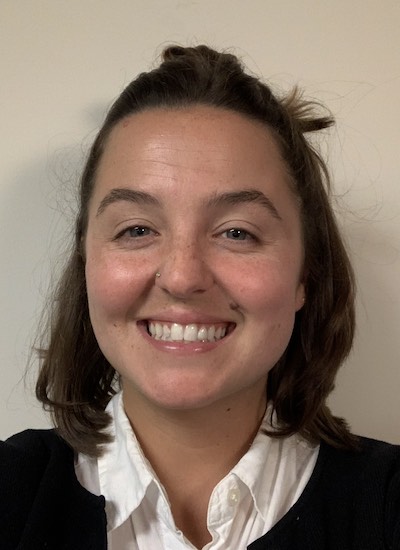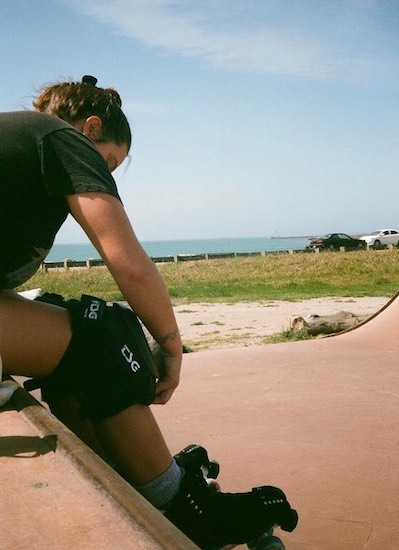
Student Spotlight: Caitlin Firmage
 “In one of the first classes I ever took at the 91ľ«Ć·, Dr. Bharier shared the research finding that one of the best and most reliable predictors of outcomes in therapy is the therapeutic alliance or relationship (Bordin, 1979; Duncan and Miller, 2009; Horvath & Symonds, 1991; Martin, Garske, & Davis, 2000),” shared Caitlin Firmage, a student in the 91ľ«Ć·â€™s Clinical Psychology Program. “During a time when it felt like I had so much to learn and there were so many ways I could make possible mistakes as a new therapist, this discussion grounded me in remembering that, at its core, therapy is about building relationships with our clients based on respect, empathy, warmth, curiosity, and humility in the process.”
“In one of the first classes I ever took at the 91ľ«Ć·, Dr. Bharier shared the research finding that one of the best and most reliable predictors of outcomes in therapy is the therapeutic alliance or relationship (Bordin, 1979; Duncan and Miller, 2009; Horvath & Symonds, 1991; Martin, Garske, & Davis, 2000),” shared Caitlin Firmage, a student in the 91ľ«Ć·â€™s Clinical Psychology Program. “During a time when it felt like I had so much to learn and there were so many ways I could make possible mistakes as a new therapist, this discussion grounded me in remembering that, at its core, therapy is about building relationships with our clients based on respect, empathy, warmth, curiosity, and humility in the process.”
Caitlin was born in San Francisco and raised in Mill Valley, where she lived with her parents and her younger sister. “I am very grateful to have grown up with my grandparents and cousins around as well,” she added. Caitlin attended public schools and had an affinity for reading and writing. She participated in many sports and loved spending time in the sun. “Growing up, I was always very curious about people, relationships, and how humans connect and interact with one another,” Caitlin reflected. “I have always been drawn to experiences and work that has allowed me to build relationships and learn more about other people and their stories.”
For her undergraduate studies, Caitlin attended and graduated Magna Cum Laude with a BA in Psychology. “I had very little exposure to psychology until I took an introduction to psychology class as a part of general education requirements in college,” she recalled. “After this class, my original plans of pursuing pre-med courses in preparation for medical school completely shifted.” Dedicating her life to working to understand the world and other people really appealed to Caitlin. “I was also drawn to psychology as a pathway to action for addressing the many inequities in our world and for leveraging the unearned privileges I have through my professional and personal work,” she reflected. Caitlin was particularly focused on learning how to decrease the barriers that keep people from accessing mental health care.
While at Georgetown, Caitlin also earned a minor in Women’s and Gender Studies. “I decided to minor in Women’s and Gender studies in a similar manner to how I found psychology,” she shared, “by taking courses that reflected my interests and the areas in which I wanted to learn and grow.” Her classes were “focused on thinking critically about how power and systems of oppression, like those that surround gender and race, function in society and impact our lives differently.” This led Caitlin to examine how she shows up in the world and with her clients given her own social location and cultural background, which she considers to be central to her development as a psychologist.
In 2015, Caitlin spent a semester in Chile studying at the . She lived with a host family and considered it a privilege to be welcomed into their home. “One of the most valuable things I gained from this experience was the relationships I built with my host mother and sister through being able to bear witness and to and share in their daily life,” she recalled. “It was such a joy to just sit around the table and share meals together as a way to connect and learn about each other’s lives.” This was undoubtedly a very formative experience for Caitlin.
Caitlin worked on the Mobile Services and Outreach Team for in Washington, DC from 2015-2016, managing and operating their daily outreach van service. “Working within a harm reduction and community-based agency set the foundation for my values as a developing clinician, particularly that in order to provide accessible and high quality services they need to be fundamentally informed and developed by the community you serve,” she reflected. “It was also an opportunity for me to reflect on the ways in which the societal stigma that often surrounds substance use and sex work impacted the ways I showed up in providing care, and I was grateful to be able to do this unlearning and work within a community of providers like those at HIPS.” Caitlin described working for HIPS as a deeply formative experience in her early career.
In 2017, Caitlin traveled to Indonesia and completed the PADI Divemaster training as part of the program. She had always loved the ocean, so when a friend suggested that she should get her Divemaster certification, Caitlin saw it as “a way to explore this curiosity and love for the ocean to the fullest.” After completing the training, Caitlin led diving courses with international clientele in English and in Spanish. “My favorite part of leading diving courses was the incredible opportunities I had of meeting and working with people from all over the world,” she recalled, “as well as being able to discover something new and often breathtakingly beautiful underwater everyday.”
From 2018-2019, Caitlin worked at as a Housing Case Manager. “The most rewarding part of being a case manager was being able to sit alongside and partner with people in setting and working towards their own goals for their health and well-being, as well as seeing them get there!” she reflected. In this position, she worked with clients who had contended with chronic homelessness and other marginalizing experiences, many of whom had a history of having their goals dictated to them by others. “The most challenging aspect of this role was navigating the fractured systems my clients were often contending with,” she shared, “and bearing witness to the many ways in which the systems that are supposed to support folks can often cause further harm or present additional obstacles to getting the care and services everyone is entitled to.”
Caitlin enrolled in the Clinical Psychology Program at the 91ľ«Ć· in the fall of 2019. She decided to pursue a PsyD in Clinical Psychology because she wanted to prioritize clinical work in her future career. “I selected the 91ľ«Ć· for its commitment to training clinicians to society and emphasis on utilizing psychology as a tool for social justice, as well as for the opportunity to jump right into a variety of practicum training experiences from the first year,” she reflected. Thus far, her toughest challenge has been dealing with the impact of the COVID-19 pandemic, “both in the loss of being able to share physical space together and the impact on client services and training experiences.” Her favorite memory of her time at the 91ľ«Ć· is eating lunch on the rooftop deck of the Durant building with her friends.
The most valuable lesson Caitlin has learned during her time at the 91ľ«Ć· is to be honest with herself. “This can show up in so many ways throughout graduate school,” she shared, “in terms of both being compassionately honest about assessing where you are at in terms of work-life balance, and in being present for the internal reflection that is asked of you along the way to becoming a psychologist.”
The title of Caitlin’s dissertation is “The Impact of Sex Work Stigma on Mental Health Providers’ Perceptions of Transgender Sex Workers,” which was inspired by her experiences providing care to sex workers while working at HIPS. “I remember my orientation at HIPS and the process of beginning to recognize and unlearn the stigmatizing beliefs that I held about sex workers and sex work,” she reflected. Caitlin’s clients at HIPS described experiencing stigma and discrimination based on their occupation, race, gender, and socioeconomic status. While working on her dissertation, she found that “the existing literature shows that experiencing stigma can have a significant and widespread negative impact on the mental health, safety, and well-being of sex workers, and on transgender sex workers of color in particular.” Despite those findings, there has been little research into how the stigma surrounding sex work impacts the attitudes of mental health providers, so Caitlin’s dissertation seeks to fill that gap. “My hope for this dissertation is to begin to illuminate how stigma might be contributing to a gap in both knowledge and clinical practice and to contribute to the efforts to develop training in providing culturally responsive care to sex workers,” she shared.
Since August of 2020, Caitlin has worked at , first as a Psychology Trainee at the Alliance Health Project, then as an Advanced Clinical Trainee at the Benioff Children’s Hospital, then as a Neuropsychological Assessor at the brainLENS Research Lab, and finally as an Advanced Assessment Trainee at the Alliance Health Project. Her biggest takeaway from her time at UCSF has been that she enjoys and thrives working in an integrated care setting. “Taking on these different roles also helped solidify my belief that mental health care often needs to be holistic and wrap-around in order to best meet client needs,” she recalled, “and that working within a multidisciplinary setting like those at UCSF allows you to collaborate and consult with so many different providers.”
 In her spare time, Caitlin really enjoys roller skating. “I like to skate on trails, learn new dance moves, and go to the skate park,” she shared. “ I have found a lot of joy, safety, and power in moving through these spaces with my friends and community.”
In her spare time, Caitlin really enjoys roller skating. “I like to skate on trails, learn new dance moves, and go to the skate park,” she shared. “ I have found a lot of joy, safety, and power in moving through these spaces with my friends and community.”
Caitlin is currently completing her internship at in New York. As of now, she’s still deciding on the direction of her career after graduation. “I hope to specialize in providing both therapy and assessment to queer youth,” she reflected, “and I can envision myself working in a variety of settings in the future, including schools, community mental health, and private practice.” Regardless of the path she chooses, we’re excited to see Caitlin’s contributions to the field of psychology in the future.
